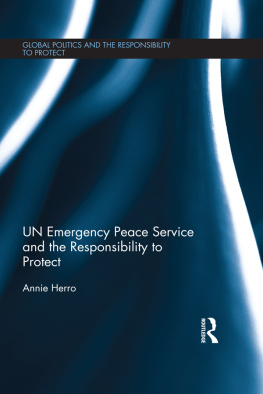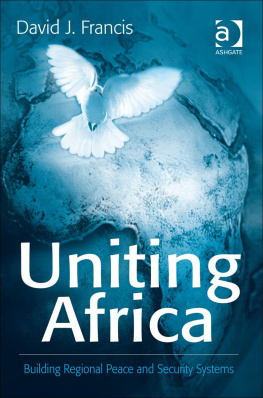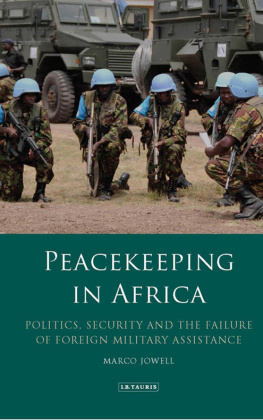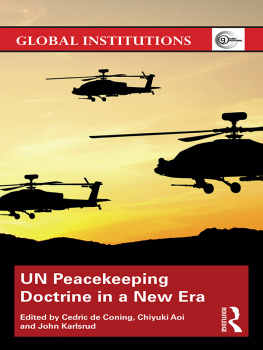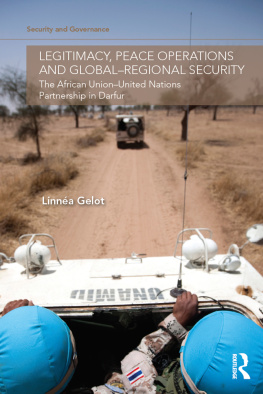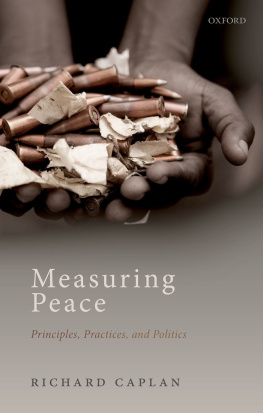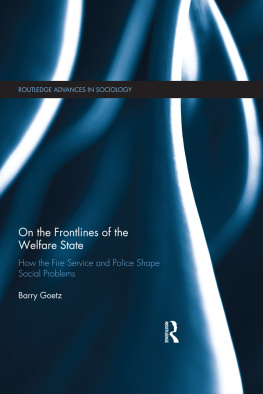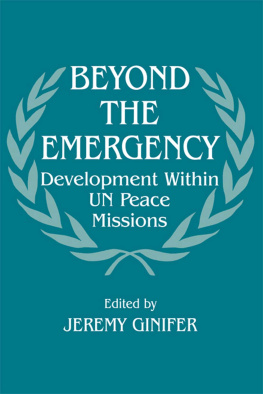UN Emergency Peace Service and the Responsibility to Protect
This book examines the attitudes of political, military and non-state actors towards the idea of a United Nations Emergency Peace Service (UNEPS), and the issues that might affect the establishment of this service in both theory and practice.
UNEPS is a civil societyled idea to establish a permanent United Nations service to improve UN peace operations as well as to operationalise the emerging norm of the responsibility to protect civilians from atrocity crimes. The UNEPS proposal has received limited support. This book argues that interest in, and support for, the UNEPS proposal is influenced by perceptions that it would erode state sovereignty, the extent to which the principles of the proposal are consistent with actors views on the world and perceptions on whether UNEPS will realistically contribute to the workings of the UN and regional peacekeeping systems in areas where these are seen to be deficient.
This book makes the case for localising the UNEPS proposal so that it is more consistent with the attitudes of those consulted for this research. It concludes that developing less controversial proposals could be the first steps to creating a rapidly deployable service with the mandate to prevent atrocity crimes.
This book will be of great interest to students and scholars of peace operations, the Responsibility to Protect, international organisations, international relations and security studies.
Annie Herro is a lecturer at the Centre for Peace and Conflict Studies, University of Sydney, Australia, and has a PhD in Peace and Conflict Studies.
Global politics and the responsibility to protect
Series Editors:
Alex J. Bellamy
Griffith University
Sara E. Davies
Griffith University
Monica Serrano
The City University of New York
The aim of this book series is to gather the best new thinking about the responsibility to protect into a core set of volumes that provides a definitive account of the principle, its implementation and its role in crises, and that reflects a plurality of views and regional perspectives.
Global Politics and the Responsibility to Protect
From words to deeds
Alex J. Bellamy
The Responsibility to Protect
Norms, laws and international politics
Ramesh Thakur
Humanitarian Intervention and the Responsibility to Protect
Security and human rights
Cristina G. Badescu
Sri Lanka and the Responsibility to Protect
Politics, ethnicity, genocide
Damien Kingsbury
International Responsibility and Grave Humanitarian Crises
Collective provision for human security
Hannes Peltonen
Global Justice, Kant and the Responsibility to Protect
A provisional duty
Heather M. Roff
UN Emergency Peace Service and the Responsibility to Protect
Annie Herro
First published 2015
by Routledge
2 Park Square, Milton Park, Abingdon, Oxon OX14 4RN
and by Routledge
711 Third Avenue, New York, NY 10017
Routledge is an imprint of the Taylor & Francis Group, an informa business
2015 Annie Herro
The right of Annie Herro to be identified as author of this work has been asserted by her in accordance with sections 77 and 78 of the Copyright, Designs and Patents Act 1988.
All rights reserved. No part of this book may be reprinted or reproduced or utilised in any form or by any electronic, mechanical, or other means, now known or hereafter invented, including photocopying and recording, or in any information storage or retrieval system, without permission in writing from the publishers.
Trademark notice: Product or corporate names may be trademarks or registered trademarks, and are used only for identification and explanation without intent to infringe.
British Library Cataloguing-in-Publication Data
A catalogue record for this book is available from the British Library
Library of Congress Cataloging-in-Publication Data
Herro, Annie.
The UN Emergency Peace Service and the responsibility to protect / Annie Herro.
pages cm. (Global politics and the responsibility to protect)
Includes bibliographical references and index.
1. United Nations. Emergency Peace Service. 2. United Nations
Peacekeeping forces. 3. Responsibility to protect (International law)
4. AtrocitiesPrevention. I. Title.
JZ6374.H47 2014
355.357dc23
2014016392
ISBN: 978-0-415-71919-3 (hbk)
ISBN: 978-1-315-81699-9 (ebk)
Typeset in Times New Roman
by Wearset Ltd, Boldon, Tyne and Wear
This book is based on a PhD thesis I wrote at the Centre for Peace and Conflict Studies (CPACS) at the University of Sydney. I would like to thank the following people who have all contributed to my research journey.
My sincere thanks go to my former PhD supervisors, Wendy Lambourne and Stuart Rees. Wendy has shown an unwavering commitment to and genuine enthusiasm for my work. Her willingness to read multiple versions of the thesis and book has exceeded all expectations. Both the thesis and book have benefitted enormously from her sharp and insightful feedback. Stuart introduced me to the UNEPS proposal and encouraged me to undertake a PhD on this topic. He has been an inspiring, generous and steadfast mentor.
I thank Jake Lynch for creating a relaxed and motivating space at CPACS that is conducive to generating politically bold and academically rigorous research. All my friends and colleagues in the CPACS research community, including Cammi Webb-Gannon, James Tonny Dhizaala, Eyal Mayroz, David Penklis, Vivianna Rodriguez Carreon, Peter King, Rachael Hart, Neven Bondokji, Punam Yadav, Lydia Gitau, Bona Mkandawire, Annabel McGoldrick, Paul Duffill, Leticia Anderson, Lucy Fiske, Lynda Blanchard, Ken Macnab and Gary Trompf, have provided a stimulating source of ideas and discussion. Thushara Dibley, especially, was always available to help me with all sorts of research-related stumbling blocks and to celebrate my successes. I also thank Louise Chappell, Franklin Obeng-Odoom, Raymond Apthorpe and Vesselin Popovski for the little gems they shared with me during the transition from PhD to book.
I am grateful to colleagues at the Centre for Peace and Conflict Studies at Cornell University, where I spent time as a visiting scholar in 2013, for offering a welcoming and thought-provoking environment in which to write this book. I am particularly grateful to Matthew Evangelista for his feedback on .
I thank Bob Zuber from Global Action to Prevent War with whom I have spent many hours discussing the subject of a UNEPS. Bob has offered important encouragement for this research and organised a series of UNEPS-related events which generated rich data that I draw on in the pages that follow. Kavitha Suthanthiraraj has also been a delightful colleague who has contributed valuable ideas to how I think about a UNEPS. Certain insights in this book are taken from the chapter Framing a Protection Service which I co-authored with Kavitha. It was published in the 2012 book Norms of Protection: Protection of Civilians and the Responsibility to Protect , edited by Angus Francis, Vesselin Popovski and Charles Sampford. Parts of this chapter have been reproduced with permission from the United Nations University Press.
I also thank Peter Langille, Saul Mendlovitz and William Pace for sharing their experiences on the early days of the UNEPS advocacy initiative and their perspectives on the UNEPS proposal.

